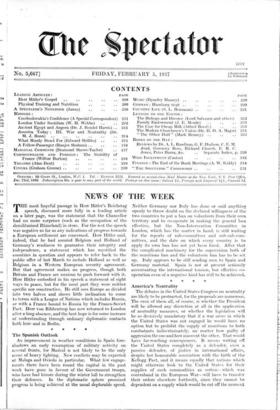America's Neutrality The debates in the United States Congress on
neutrality are likely to be protracted, for the proposals are numerous. The crux of them all, of course, is whether the President will be allowed any discretion at all in the application of neutrality measures, or whether the legislation will be so decisively mandatory that if a war arose in which the United States was not engaged he would have no option but to prohibit the supply of munitions to both combatants indiscriminately, no matter how guilty of aggression the one and how innocent the other. That would have far-reaching consequences. It means writing off the United States completely as a defender, even a passive defender, of justice in international affairs, despite her honourable association with the birth of the Kellogg Pact, and it means equally that nations which might otherwise look to the United States for their supplies of such commodities as cotton—which was contraband in the European War—will have to transfer their orders elsewhere forthwith, since they cannot be dependent on a supply which would be cut off the moment they were engaged in war, even in a League of Nations war. That may in the end weigh more with Congress than the desires of the President, who is naturally opposed to having his hands tied by mandatory legislation.



















































 Previous page
Previous page